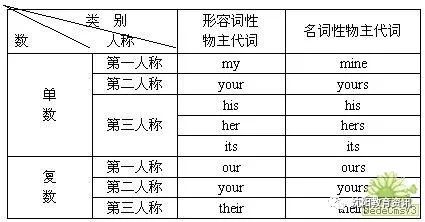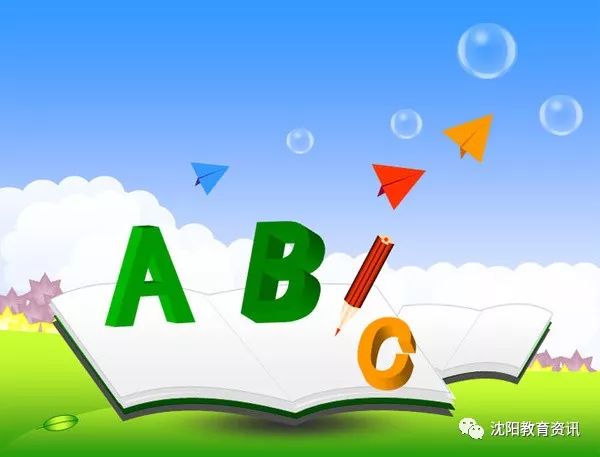初中英语语法:代词 |
您所在的位置:网站首页 › 我们的名词代词 › 初中英语语法:代词 |
初中英语语法:代词
|
1.人称代词的一般用法: He is my friend.他是我的朋友。 It's me. 是我。 My dog likes him.我的狗喜欢他。 (1)作主语(用主格) I like table tennis. 我喜欢打乒乓球。 He is a student. 他是个学生。 (2)作表语(用主格,口语中常用宾格) Who is there?It's me(I). 是谁啊?是我。 (3)作宾语(用宾格) Do you know him? 你认识他吗? Come with me. 跟我来。 注意 I(我)无论放在句首、句中或句尾,都要大写。 2 特殊用法的人称代词 It will rain tomorrow. 明天会下雨。 They speak English in the country. 在那个国家,人们说英语。 人称的习惯顺序: (1)如果有几个不同的人称同时作主语,且用and,or连接时,习惯顺序是: 单数:you,he,and I 复数:we,you,and they 但是,如果是做错事,承担责任时,有时,说话的人把I(我)放在第一位。 ----Who broke the Window?谁打碎了玻璃? ---I and Li Ming. 我和李明. (2)we,you,they的特殊用法 we,you,they有时并非指特定的人,译时不必译出“我们”、“你们”、“他们”。 We had a heavy rain last week. 上周下了场大雨。 You don't see many foreigners here. 这儿,人们见不到许多外国人。 They speak English in Canada. 在加拿大,人们说英语。 II物主代词 表示所有关系的代词叫做物主代词,也可叫做代词所有格。物主代词分形容词性物主代词和名词性物主代词二种,其人称和数的变化见下表。
1. 物主代词的用法 This is my father. 这是我父亲。 Is that bike yours?Yes,it's mine. 那辆自行车是你的吗?是的,那是我的。 (1)形容词性物主代词是形容词作用 在句中只能作定语,换句话说,形容词性物主代词后面一定要跟上一个名词。 I like his car. 我喜欢他的小汽车。 (2)名词性物主代词可作主语 Our school is here,and theirs is there. 我们的学校在这儿,他们的在那儿。 (3)名词性物主代词可作表语 Whose bike is this?It's hers.(=her bike) 这是谁的自行车?是她的。 Is that car yours?Yes,it's mine. 那辆车是你的吗?是的,它是我的。 (4)名词性物主代词可作宾语 Let's clean their room first and ours(=our room)later. 咱们先打扫他们的房间,然后再打扫我们的。 I have lost my dictionary. Please lend me yours. 我的字典丢了,请把你的借我好吗? a friend of mine 的用法 句型: a(an,this,that,some,no)等+名词+of+名词性所有格。按此句型“我的朋友之一”应译为a friend(名词)of mine(名词性所有格)。 A friend of ours is coming soon. 我们的一个朋友马上就来。 That watch of hers is beautiful. 她的表很漂亮。(暗示她有许多表) 注意: 冠词a(an,the)和this,that,some等词后不能加所有格。 (×)a my friend III指示代词 表示“这个”、“那个”、“这些”、“那些”等指示概念的代词叫做指示代词。指示代词有this,that,these,those等。 this(复数形式是these),是指在时间上或空间上离说话人较近的人或物。 that(复数形式是those),是指在时间上或空间上离说话人较远的人或物。 1指示代词的基本用法(在句子中可作主语、表语、宾语和定语) This is my doll. That is Mary's。 这是我的洋娃娃,那是玛丽的。 (1)作主语 That is a good idea. 那是个好主意。 (2)作表语 What I want is that(this).我想要的是那(这)个。 (3)作宾语 You like this but I like that. 你喜欢这个,而我喜欢那个。 (4)作定语 What is the use of those books? 那些书有什么用处呢? 2 指示代词的特殊用法 The history of China is as interesting as that of America. 中国的历史和美国的历史一样有趣。 (1) 为了避免重复,可用that,those代替前面提到过的名词。但是this,these不可代替。 EG:The weather of Kunming is better than that(=the weather)of Beijing. The radios made in Shanghai are as good as those(=the radios)made in Tianjin. 上海生产的收音机和天津生产的一样好。 (2)this,that有时可代替句子或句中的一部分。 He was ill. That's why he didn't come.(that作主语,代替He was ill.) 他病了,那就是他没来的原因。 He broke the window,and that cost him 10dollars. 他打破了窗玻璃,那(打破玻璃这件事)要花费他10美元。 (3 )this 在电话用语中代表自己,that 则代表对方。例如: Hello! This is Mary. Is that Jack speaking?
IV反身代词 英语中用来表示 “我自己”,“你自己”, “他自己”,“我们自己”,“你们自己”等意义的代词称为反身代词,也有人称之为自身代名词,其形式如表所示。
常见词组有enjoy oneself , dress oneself V不定代词 不是指明代替任何特定名词的代词叫做不定代词。常见的不定代词有all,both,each,every,some,any,many,much,(a)few,(a)little,one,ones,either,neither,other,another,no,none以及含有some-,any-,no-等的合成代词(如:anybody,something,no one)。这些不定代词大都可以代替名词和形容词,在句中作主语、宾语、表语和定语,但none和由some,any,no,every+thing,-body,-one构成的复合不定代同(如somebody等)只能作主语、宾语或表语;every和no只能作定语。(这些词作定语时,有些语法书称之为形容词)下面我们把一些主要的不定代词用法归纳如下: 1 one的用法 (1)one(一个),可以指人,也可以指物。在句中可作主语、宾语和定语。 one(主语)should not praise oneself(宾语). 一个人不应炫耀自己。(one作主语和宾语) If one wants to visit the city,one must find one's own guide. 如要参观这个城市,得自己找向导。 (2)one,ones(one的复数形式)可用来代替前面出现过的少数名词,以避免重复。 Do you have a car?Yes,I have one. 你有一辆小汽车吗?是的,我有一辆。 I like small cars better than large ones. 我喜欢小汽车,不喜欢大汽车。 (3)one的前面可用this,that,the,which等词修饰。 Eg:There are three pens,which one is yours,this one or that one or the one in the pencil-box? (4)a+形容词+one这一形式,经常见到或使用。 I have an old bike,but he has a new one. 我有辆旧自行车,他有辆新的。 own后面不用one Your shoes don't fit me,I'd better wear my own. 我穿你的鞋不合适,我最好还是穿我自己的。 比较it和one的比较 it用来指特定的东西(the+名词);而one则用于替代不特定的东西(a,an+名词) You have a pen,can I use it(=the pen)? 你有一支钢笔,我可以用它(这支钢笔)吗?(特指) Do you have a pen?Yes,I have one(=a pen). 你有钢笔吗?是的,我有一支。(泛指) 2 some,any的用法 I have some money in my pocket,but it is not enough. Do you have any? 我口袋里有一些钱,但不够,你有钱吗? (1)some,any可与单、复数可数名词和不可数名词连用。some一般用于肯定句中,any一般用于否定旬、疑问句和条件句中。 I have some science books. 我有一些科技书。 There is some ink in the bottle. 瓶子里有一些墨水。 I haven't any money.(=I have no money.) Do you have any? 我一分钱都没有了,你有(钱吗)? 注意 not…any =no… any在否定句、问句中不须译出来。 You can ask me if you have any questions. (2)some,any与-thing,-body,-one构成的合成词的用法与some,any一样。 I have something important to tell you. 我有重要的事告诉你。 I don't know anything about it .(I know nothing about it .) 关于这件事,我什么都不知道。 Anybody can do it. 任何人都可以做这件事。 注意 something,anything,nothing三者跟形容词时,形容词要放在它们的后面。 (3) 在疑问句中,一般不用some,只有当问句表示一种邀请或请求,或期待一个肯定的回答时才能用some。 Will you have some tea?你喝茶吗?(表邀请) Did somebody call me this morning? 今天上午有人给我打电话吧?(表可能已约好) (4)在否定句中,some表示半否定,any表示全否定。 I don't know some of you. 我只认识你们中的一些人。(我不会认识你们) I don't know any of you. 你们,我一个也不认识。 (5)some用于单数可数名词前时,表示“某个”,而不是“一些”。 This morning some boy asked for you. 今天上午,有个男孩要求见你。 There must be some reason for what he's done. 他干这些事,肯定有某种原因。 比较: Is there anything to eat?有什么吃的吗? (不知有没有,只是问一问) Is there something to eat? 有一些吃的吧?(希望,而且断定会有) 3 few, a few, little, a little在用法上的区别 (1) 含义用法 表示肯定 表示否定 用于可数名词 a few虽少,但有几个 few不多,几乎没有 用于不可数名词 a little,虽少,但有一点 little不多,没有什么 (2)other, the other, another, others, the others的区别 用 法 用法 代名词 形容词 单数 复数 单数 复数 不定 another另一个 others别人,其他人 another (boy)另一个(男孩) other (boys)其他男孩 特定 the other另一个 the others其余那些人、物 the other (boy)另一个男孩 the other (boys)其余那些男孩 1)other可以作形容词用,后面可以跟单数或复数名词,意思是“其他的、别的”。 Where are his other books? I haven't any other books except this one. 2)other也可以用作代词,与冠词the连用构成“the other”,表示两个人或物中的“另一个”。常与one搭配构成“one ..., the other ...”句型。 He has two brothers. One is 10 years old , the other is 5 years old. She held a ruler in one hand and an exercise-book in the other. 3)other作代词用时,可以有复数“others”,泛指“另外的人或物”。常与some搭配构成“some ...., others ...”句型。 Some went to the cinema, others went swimming. This coat is too large. Show me some others, please. 4)“the others”表示特指某范围内的“其他的人或物”。 We got home by 4 o'clock, but the others didn't get back until 8 o'clock. In our class only Tom is English, the others are Chinese. 5)another可以作形容词用,修饰后面的名词,意为“另一个”,还可以跟代词one. You can see another ship in the sea, can't you? Mary doesn't want to buy this skirt. Would you please show her another one? 6)another也可以作代词用,表示“另一个”。 I'm still hungry after I've had this cake. Please give me another. 必背! 惯用词组each other , one another, one after another(一个接一个) the other day(前几天) VI相互代词 表示相互关系的代词叫做相互代词。相互代词有each other 和one another两种形式。在当代英语中,each other和one another没有什么区别。相互代词可在句中作宾语,定语。作定语用时,相互代词用所有格形式。 We should learn from each other / one another. (作宾语) We often borrow each other's / one another's books. (作定语) VII常见不定代词的一般用法: 分类 都 都不 任何(一个) 每(一个) 另一个 涉及两者时 Both Neither Either Each The other 涉及三者及以上 All None Any Every Anther 1 all,both的用法 (1)all代表或修饰两个以上的人或物,或不可数的东西。在句中可作主语、表语、宾语、同位语和定语。 注意: all,both的位置和频度副词一样放在be动词、情态动词及助动词之后,如有多个助动词,则放在第一个助动词之后。放在一般动词(实义动词)之前。 They all(both)went there. 他们(两个)全都去那里了。 (2)both是指两者都…;而all是指三个和三个以上的人或物都…。在句中可作主语、宾语、同位语和定语。注意它们的区别: 比较 They were all waiting outside the gate. 他们(三个以上)都在大门外等着。 They were both waiting outside the gate. 他们两个都在大门外等着。 2 each,every的用法 (1)从数量上看:each用来指两个或两个以上的人或物中的一个。every则指两个以上的人或物中的一个。 There are many trees on each side(不能用every side)of the street. 大街的两侧有许多大树。 On each(every)side of the square there were soldiers. 广场的四周都是士兵。 (2)从含义和语法功能上看:each是“单个”的意思,侧重于个体、个性,在句中可作主语、同位语、定语和宾语。 而every是“每一个”的意思,侧重全体、整体、共性。在句中只能作定语,也就是说它后面必须跟着名词。 必背! 含有every的词组 every week每周 ; every two weeks每两周 every other day(week,line)每隔一天(每隔一周,每隔一行) every other ten days每隔十天 Every student is here.=All the students are here. 所有的学生们都出席了。(强调整体) Each of the boys has a bike. 每个男孩子都有一辆自行车。 (each作主语,强调个体,每一个)。 each作同位语时在句子中位置及谓语动词的变化。 The students have two pens each.(作同位语) 每个学生有两支钢笔。 They each have two pens.(作同位语) 他们每人有两支钢笔。 Each of the students has two pens.(作主语) 每个学生有两支钢笔。 Each of them has two pens.(作主语) 他们每人有两支钢笔。 注意 every在句中只能作定语,而它的合成词只能作主语、宾语和表语,而不能作定语,也就是说every后面必须跟名词,而它的合成词后面绝不可能跟名词。 Every boy is here .=Everybody is here.每个人都在。 3 either,neither,both的用法 either:指两者中的任意一个。 neither:指两者中没有一个,全否定。 both:指两者都,肯定。 在句中可作主语、宾语和定语。 Neither of the films is good. 两部电影都不好。(没有一部是好的) Either of the films is good.(作主语,谓语动词用单数) 两部电影中有一部不错。 注意: 标题上三词作定语时的比较,both后面的名词要用复数,谓语动词用复数。 either和neither后面的名词要用单数,谓语动词用单数。 4 many,much的用法 Many(of)the students have sports.(作主语) 许多学生参加体育锻炼。 He has not got much time to go over his lessons.(作定语) 他没有多少时间复习功课了。 We are many;you are few.(作表语) 我们是多数,你们是少数。 She has much(work)to do.(作宾语) 她有许多工作要去做。 VIII疑问代词 疑问代词有who,whom,whose,what和which等。疑问代词用于特殊疑 问句中,一般都放在句首,并在句子中作为某一句子成分。例如: Who is going to come here tomorrow? (作主语) IX关系代词 关系代词是一种引导从句并起连接主句和从句作用的代词。关系代词有 who, whose, whom, that, which. 它们在句中可用作主语,表语,宾语,定语. 在主句中,它们还代表着从句所修饰的那个名词或代词。例如: I hate people who talk much but do little. X it的用法小结 1指代上文提到的名词 There is a pen on the desk. It’s mine 2表示时间,天气,距离等 It’s raining so heavily. 3做句子的形式主语 It took the villagers ten years to build that road. 4做句子的形式宾语 They found it hard to learn English well. We really think it crazy that some people swim in rivers in winter. Her illness made it a problem to have sports. 5强调句中 It is….that/who It’s the bad weather that made us lose our way.返回搜狐,查看更多 |
【本文地址】
今日新闻 |
点击排行 |
|
推荐新闻 |
图片新闻 |
|
专题文章 |


